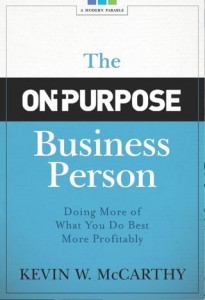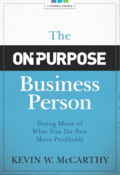
Being a line manager or staff person defines the role of one’s job, but it need not define your attitude and approach to your job.
In this On-Purpose® Business Minute, let’s explore a structural reality that affects on-the-job performance, often negatively. It need not be so if one is simply willing to see the job differently and Think Inc!—the mindset of being a line leader even if you have a staff job.
The absence of leadership is often cited.
When you’ve had a lousy customer service experience it is most often because someone wasn’t willing to make a decision or someone else away from the situation had created a broad, inflexible policy. There’s little worse than having a customer service person (staff person) cite you the limitations of their job and why they can’t help you.
When the overarching cloud of their superior’s policies outweighs the frontline person’s inherent common sense and desire to do right for their customer, everyone suffers.
Here’s an example from a few years ago. Judith and I were flying from Washington, DC, back to Orlando on a 6:00 PM flight. I discovered there was an earlier flight to Orlando at 3:00. We showed up at the airport at 1:30 to see if we could catch a ride on the early flight with US Airways. Good news—they had plenty of seats and would be happy to change our seats for $75 each. Being a travel veteran over the decades, I said, “What if we fly standby and take open seats on an as-available basis?” It seemed like a straight-forward logical win-win request.
Stupid me! I was told that we couldn’t get on the earlier flight because “US Airways needed to generate revenue on those seats.” Pardon me, I thought I had paid for two seats and they were already generating revenue from our business. Under the logic of airline seats being a “perishable product” my practical argument was, “Hey, if the empty seats haven’t filled within 90 minutes of flight time, don’t you have a higher probability of selling seats on the later flight that is almost full?”
What was I thinking? “Why should US Airways want to take care of the passengers standing at the gate while increasing their own odds with getting some yet-to-show-up new passenger to pay for the later flight?” But that’s the way my mind works.
US Airways, however, has a scarcity mindset … the customer wants something we have, we already have their money, so let’s gouge them for some extra revenue instead of accommodating their request. Even the ticket agents and customer service person were visibly unhappy about having to enforce a logical customer request that was thwarted by policies called, “We need to earn revenue on that seat.” I was given that as an excuse by multiple people over numerous times. Wow, how degrading and transactional to quote policy like that to the customer.
By the way, we decided to hang on to our $150 and took our scheduled flight.
US Airways gets my nomination for being off-purpose with this matter. Not surprisingly, a Google search for their corporate purpose, vision, mission, or values reveals none.
To the credit of US Airways, their front line counter agent and supervisor tried to be helpful within their limitations. We traveled home safely and for that, I’m thankful to US Airways.
Be On-Purpose!
Kevin
